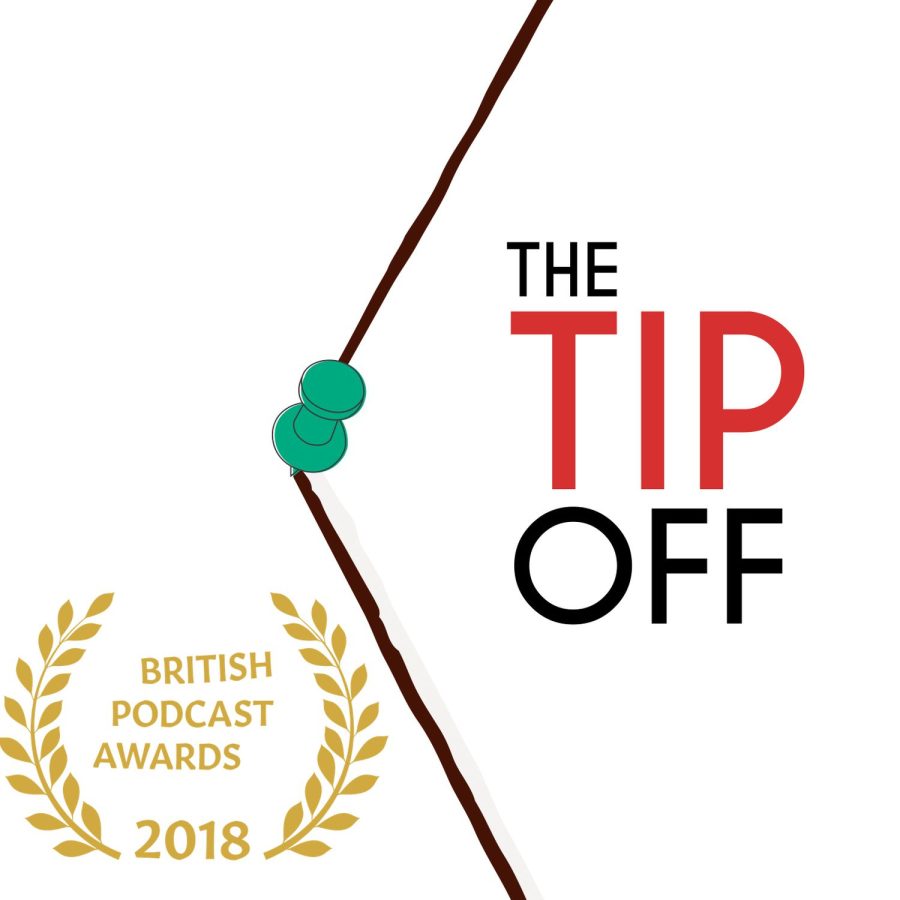“The Tip Off” Dives into the Depths of Investigative Journalists’ Fact-Finding Tactics
The podcast informatively explores how particular investigative journalists find the facts for some of their most well-known stories.
March 13, 2023
Detectives are known for their characteristic ability to use clues to solve their cases. In a similar manner, journalists piece together various bits of information to form a story. And just like detectives on cop shows, sometimes all a journalist needs to end up with a breaking news story is a small detail, a starting point, a tip off.
The podcast “The Tip Off” reveals the backstory behind the detective work contributing to some of the best investigative journalism. The first episode was published in June 2017, while the most recent episode was published in June 2022. Episodes range from around 18 minutes to just over 40 minutes. They usually explore a different case per episode, although sometimes a single story will span two episodes. The podcast is both engaging and educational, especially for people who are curious as to how investigative journalists craft their stories.
“The Tip Off” is hosted by Maeve McClenaghan, an investigative journalist who currently works for the Bureau of Investigative Journalism. Her investigations have previously been published in the New York Times, the Guardian and BBC radio, among many others. Some of her articles from 2022 include “‘Exposed to horrendous things’: young people in UK speak out against evangelical church,” in which ex-followers of a church in London say they were pressured to give money and were told that demons caused mental health issues; and “Sent to jail for feeding the pigeons: the broken system of antisocial behaviour laws,”, which explores the issue of mentally ill people being sent to prison in England and Wales for “antisocial behavior,” including something as minor as feeding pigeons. Additionally, in 2020, McClenaghan published her first book, “No Fixed Abode: Life and Death Among the UK’s Forgotten Homeless,” which tells the true personal accounts of homeless people in the United Kingdom.
According to “The Tip Off”’s About page on Acast’s website, the podcast primarily involves some of the best investigative journalists discussing how they follow leads for stories.
“There’ll be car chases, slammed doors, terrorist cells, meetings in dimly lit bars and cafes, wrangling with despotic regimes and much more,” the website says. “If you’re curious about the fun, complicated detective work that goes into doing great investigative journalism,” this is the podcast for you.
The title of the podcast is vital to its topic. In each episode, a certain investigative journalist uses a single piece of information about a surprise event or breaking news, known as a tip off, to inspire them to begin their investigation. Although the episodes are about the ins and outs of journalism and thus most relevant to those interested in the profession, the facts unveiled during the investigations are accessible to anyone who wants to learn more information about the behind the scenes of news stories.
As a journalist, I find the focus of the podcast both inspiring and eye-opening. The minute scale of the tip off makes me realize how a breaking news story can start out as such a small detail, while the sheer amount of time some of the journalists spend gathering information for a single story gives me a realistic depiction of what being an investigative journalist would entail. In Episode One, “Follow the money,” it took Heidi Blake over two-and-a-half months to record the secret footage of the men passing off the money that she needed for her story.
Each episode is structured around the detective work that builds up to the tip off. For instance, Episode Two of “The Tip Off” begins with guest journalist Louisa Loveluck explaining how she met a man in a cafe. She describes how surprised she was at how tall, robust and ordinary he looked given what he had been through.
After the introduction, the episode transitions into the tip off. Loveluck read in an article about Syria that a guard executed a dying man in his hospital bed. It was a small detail, but it stuck with her, so she investigated further. In the short term, it led to her meeting the man in the beginning of the podcast, who survived being a patient in Hospital 601, where thousands were killed because of their involvement in the Syrian uprising. Ultimately, it led to years of Loveluck investigating and writing articles about Syria even though it was too dangerous for her to physically travel there.
The key moment in Episode Two, fittingly titled “The stuff of horror movies,” happens when Loveluck explains how, in the cafe, the survivor of Hospital 601 recalled sharing a bed with other men and boys, who kept disappearing one by one and never returning. Finally, when he was allowed to go to the bathroom, he walked in and discovered their corpses stacked higher than eye-level in the small space.
“The stuff of horror movies,” the second episode of the podcast, but the first to contain a content warning, served as a reality check for me. Journalism is all about uncovering the truth, and sometimes the truth can be gruesome or upsetting, but if that truth can help people, then it’s worth it in the end. What I wish “The Tip Off” would have explored more of is the impact of the stories that were written after all the information was obtained. At the end of “The stuff of horror movies,” Loveluck said how she wrote many more articles about Syria, but she didn’t talk about how they may have helped the war-torn country.
Some investigative journalists featured in “The Tip Off” used unconventional mediums to present their findings. For example, Episode 22 discusses the work behind Alexis Okeowo’s “A Moonless, Starless Sky,” a literary journalistic novel about extremism she investigated in Africa. This variety of perspectives from the guest investigative journalists served as a reminder of the wide range of career paths that journalists can take using the information they collect and an inspiration for me to continue pursuing journalism as a career because of the great potential it has.
If you want to learn what goes into the types of stories that make the front page of the newspaper, you should try listening to “The Tip Off.” Most episodes are the perfect length for a train ride from the DuPage suburbs into Chicago. Although “The Tip Off” is currently between series, there are 64 episodes available to watch on Acast’s website.


















